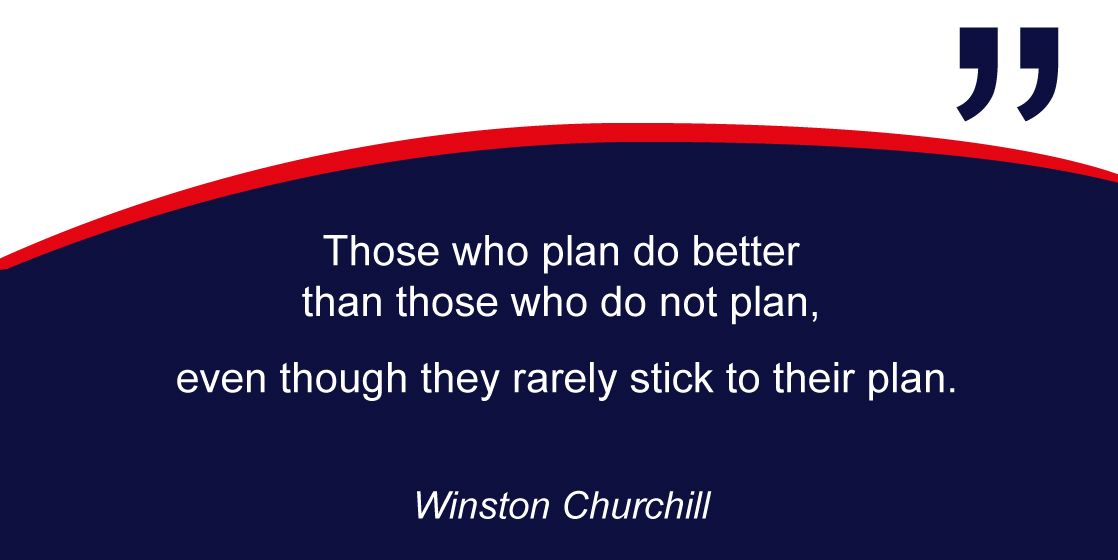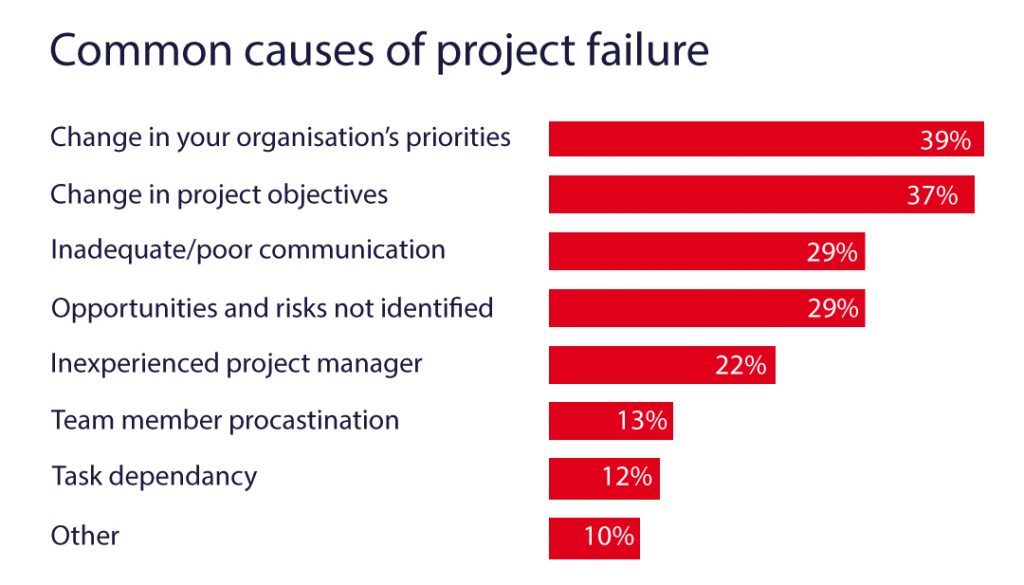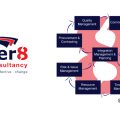How to overcome project management failure
Project management failure… The words project managers dread to hear. Let’s be honest we’ve all been there haven’t we? Excited about starting a new project. The research is done, the plan is set, you have the right team in place – what could go wrong? Suddenly, deadlines are being missed. Outputs not living up to the expectations? Stakeholders dissatisfied. Two words – ‘project failure’. But why do the best-planned projects fail, and how can you overcome project management failure?
John shares his insights on the subject.
What determines project failure?
Sometimes project failure can just be based on stakeholder judgement. Even if the project comes in on budget, does it meet the expectations of the anticipated output? On the other hand, the project may exceed expectations but come in over budget. How do you ensure you manage the right balance? Below are some of the common causes of project failure (source: Kissflow)
Irrespective of the business sector you operate in, projects are critical for companies to test their ideas, fulfil client’s needs, and solve problems.
So, let’s take these common causes and understand how to overcome them to ensure future projects succeed and to avoid project failure…
Understand the value of the project
Understand the objectives of the project from the outset. Include within this, three key attributes:
- The schedule you are to work towards
- Expectations of the deliverables
- And of course, the budget
Ensure each of these attributes has a value set against them to support the analysis of the project. A project can be successful only when the stakeholders can understand the value they can get for their input. Yet only 58% of organisations fully understand the value of their project (source: PMI). And understanding of value is only achieved through effective and ongoing stakeholder communication, engagement and discussion.
With a high percentage of organisations failing to understand the value of their projects, not only are they wasting money, there will also be dissatisfaction among employees that will eventually lead to lower employee engagement in the project.
Resource Allocation and Skillsets
The project outputs will determine the desired skillsets required as part of the resource allocation to form a high performing team. The team forms the glue between business and IT to ensure business strategy and IT security is brought together to deliver successfully against defined joined up outcomes. It’s also the glue between the business and the many third parties required to deliver the programme outcomes ensuring every party is orchestrated to perform their tasks when required and to the defined standards.
Choosing the right leader with the necessary skills based on the project will reduce the risk of project failures. A typical reason for projects failure is that project managers don’t have enough technical training in project management. They may lack the social skills to handle the project and the multiple relationships needed, or they may show inflexibility to adjust their approach to fit in with the culture, maturity and ways of working of the organisation.
Project Planning
Sometimes project failure can be down to lack of planning between the project team, project manager, and executive team. It occurs when all three levels of management don’t have access to the updated information in real-time and where responsibilities are blurred or leadership fragmented.
A successful project manager will organise recurring planning sessions to discuss problems, review performance metrics and progress and have shared visibility over the performance of each task. A high performing team who work collaboratively together will have a beneficial impact over project performance.
Predict project warning signs. As you reach halfway through project completion, organisations might miss out few signs such as a problem with cash inflow and outflow, scheduled time, project exceeding the budget. Busy managers don’t have the time to keep track of all the warning signs. We have discussed encouraging openness and the raising of concerns, your “early warning system”, in our blog – High performing programme team – 8 critical success factors.
Communication is key to overcome project management failure
According to a Capterra survey, 52% of business say the biggest impact of project management was on team communication. However, 57% of projects fail due to communication issues (source: Bull Horn). When the project is happening at a global level, lack of communication between the project managers and other stakeholders located in different parts of the world can affect the overall output and lead to delay. The type of communication needed here is the informal, the friendly, not the official.
For example in a large programme we were asked to lead, it quickly became clear that business owners based in one office and others in a different office in the same building had different expectations, used different terminology and very different priorities. At the same time, supplier project managers based with the client organisation with their counterparts offshore had a different sense of urgency and priorities and saw risks in a different light.
Between 4 key groups of individuals, there was no common ground and no platform for conversation. The creation of a common understanding and consensus apart from the formal governance where issues were highlighted and the inevitable finger-pointing was taking hold. The answer? Create opportunities for conversation, encourage dialogue, collaboration and create the realisation that differences are often opportunities to refine things and improve. This brings consensus. In other words, the creation of an open culture in the project with informal communication channels that respects differences. That seeks a ‘how can we’ response rather than ‘why we can’t’ response is key to overcoming and avoiding failure. And the way to achieve that is to lead by example.
Stakeholder Management
It’s one thing managing the resource allocated to the project, it’s another managing the stakeholders. More often than not, stakeholders will be from senior management, but they may not necessarily fully understand their role in the project. Stakeholders are your informal ‘sponsors’ for the project. They should:
- Brief the project manager on the goal and project objectives.
- Support project managers and give their final say for some of the important decisions.
- Be accountable for receiving the project deliverables and realise the benefits
A survey from project smart UK asked 1000 project managers whether roles, responsibilities, and levels of authority are always clear in the project they work for. They received the following results
- Strongly agree: 2.8%
- Agree 34.3%
- Disagree 51.0%
- Strongly disagree 9.7%
- Don’t know 2.3%
Almost 63% of them don’t know their roles or haven’t received proper instructions from their senior management. A common response to address this is to write down the responsibilities in detail, based on the belief that what’s written on reams of paper will make a difference. In fact, will add to the confusion as people will not see the wood from the trees. Those who spend the time to study the reams of paper getting frustrated why others are not following suit. Instead, clarity of role, responsibilities and authority comes from two cornerstones. 1. creating clear, concise and simple scopes of responsibility between roles. And 2. trust
Risk Management to Overcome Project Management Failure
Every project is unique and has its own uncertainty in terms of risk. It is always better to quantify the risk. While planning a financial budget, it is expected to have a percentage of risk and cost overrun that could create tension with sponsors or clients. By calculating the post-mitigation likelihood and financial impact you can determine the precise budget needed to support the project through the uncontrollable uncertainties.
Mitigation is therefore key. Project managers should be aware of how to respond to the specific risks attached to projects when they occur.
But mitigation is not just a list of actions to eventually get done. It is about speed and timeliness of action. Having the best RAID logs in the world will not result in projects being freed from the impact of risks and issues. We have all been involved in projects with fantastic risk logs that end up delaying, overspending and underdelivering.
The value is therefore not in the precision of the documentation.
So what is needed?
The value comes from using documentation to aid dialogue and making risk management part of the project’s daily life. For example, in large multi-country, multi-site programmes, I have often found the focus is on known risks and reliance on an ad-hoc and infrequent review of the risk log. Sound familiar? We know where this leads. Instead, the approach we have applied is to encourage the sharing of concerns at any forum. ‘Bad news’ is actually good when provided early enough to do something about it. Once the concern is aired, we make sure it is understood, captured and prioritised. So far so good. But to complete the picture we then take action quickly and decisively before the impact becomes real. In other words, risk management works when it becomes a way of life beyond the risk log.
Project Management Tools
44% of project managers use no software, even though using any popular commercially available PM software has been known to improve performance and project satisfaction (source: PwC). As projects get complex, the manager finds it difficult to analyse data. They must go beyond excel sheets and other basic tools to plan, execute, and keep track of other project management processes. It is better to have all the necessary tools like Gantt charts, time tracking, scheduling, and budgeting in one tool rather than using multiple software.
Of course, the right tools are not the only answer, all the points made above are the ingredients of success. Although projects can succeed without having the right tools, it is intriguing to note the same study found 77% of high-performing projects and managers use the right project management software.
So, we’ll leave you with this final thought… The same PwC study found that 97% of organisations believe that effective project management is critical to business performance and organisational success. That’s something we all can attest to from experience.
Do you have the right project management team in place? Here at Acceler8, we are:
- A project team with a diverse skillset who excel in project delivery
- Natural in communication
- Personal and able to manage key stakeholders of all levels
- Experts in identifying risks and overcoming project failure
Is this a team you need to help deliver your next project? Get in touch to discuss your requirements and understand how we can implement our high performing programme team to deliver project success and overcome project failure.








